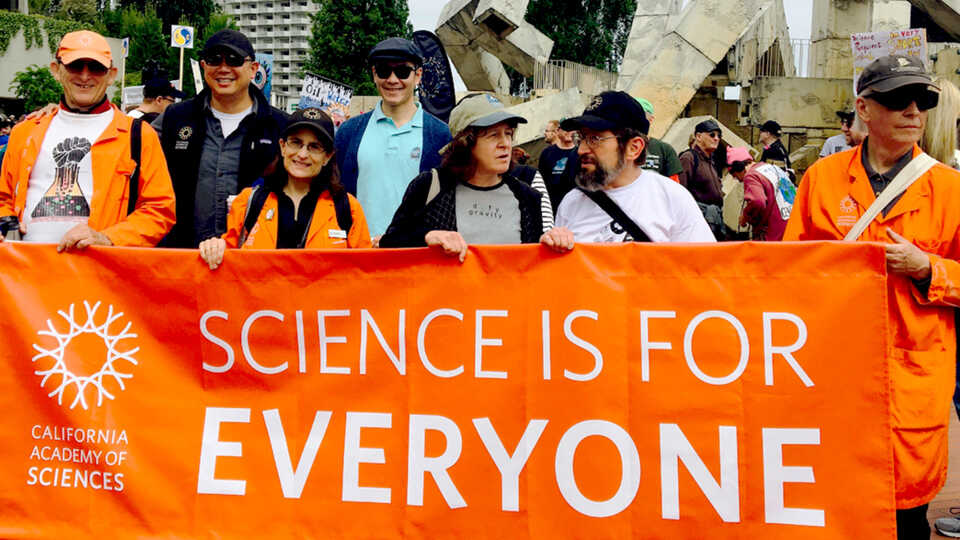The mission of the California Academy of Sciences is to regenerate the natural world through science, learning, and collaboration.

Our mission
Our vision
Within a generation, the natural world is healthier, more resilient, and wilder each year.
Core values
The Academy is committed to:
-
Exploration: We generate new knowledge and understanding of the natural world and the role of people within it through scientific excellence—asking bold questions about the nature and future of life on Earth and bringing innovation and integrity to answer them.
-
Collaboration: We recognize that we can’t solve our planet’s vast environmental challenges alone, so we partner with world-leading environmental, scientific, and community organizations to strengthen and amplify our work and reach new audiences.
-
Diversity and equity: Diverse communities are stronger and more resilient, both in nature and in human society. We are committed to cultivating a culturally inclusive and equitable environment in which diversity of thought and expression is valued, respected, and celebrated.
-
Courage: Embracing the challenge of the present moment, we don’t shy away from tough challenges. Science is more important to our daily lives than ever before, and we unapologetically advocate for using scientific data to solve problems and make informed decisions about our collective future.
-
Advocacy: We harness our voice as a scientific and cultural institution to positively impact policy and public opinion in support of thriving social and ecological communities—and by listening to, lifting up, and learning from underrepresented voices.
Code of ethics
Public trust demands that, in all activities, the Academy must act with integrity and in accordance with the most stringent ethical principles, as well as the highest standards of objectivity. All museums enjoy high public visibility and their staffs enjoy a generous measure of public esteem. To the public, people are never wholly separable from the institution. Any Academy-related action by the individual may reflect on the Academy or be attributed to it. Trustees, staff and volunteers must be concerned not only with the true personal motivations as they see them, but also the way in which such actions might be construed by the casual observer.
All those involved with the Academy share a commitment to high standards both within the organization and in dealing with others. This is a shared commitment arising out of the variety of the work done by this institution that produces a collaborative interdependence and shared values among governing board, scientific staff, and all employees, students, and volunteers. In support of its mission and values, the Academy requires its employees, trustees, and volunteers to support its ethics policy. Fair, honest, and ethical conduct and conduct consistent with the best interests of the Academy shall prevail at all times in all internal and external interactions.
The following principles arise from a commitment to honor, fairness and respect for each individual and the institution as a whole.
- Maintain the Academy’s dedication to the preservation, conservation and protection of the environment and its diverse species.
- Treat all people with consideration and practice diplomacy when dealing with fellow employees, volunteers, business partners, competitors and guests.
- Accept responsibility for decisions and actions.
- Act with integrity, in accordance with the most stringent ethical principles, and maintain the highest standards of scientific objectivity.
- Comply with all applicable laws and regulations, as well as the Academy’s policies, procedures, and practices.
- Maintain confidentiality of sensitive information except when legally obligated to disclose.
- Provide accurate, timely, clear and objective information to constituents.
- Ensure the effective and efficient use of Academy resources.
Please also see the Academy’s Collection Management Policy and Employee Handbook for detailed policies that expand on the values stated here. The Academy also adheres to the Donor Bill of Rights promulgated by the Association of Fundraising Professionals.
The Academy is committed to a work environment that values diversity, innovation, and ingenuity. All human resource policies and Academy activities are intended to create a respectful workplace where every individual has the opportunity to reach his or her highest potential. Throughout the organization, the Academy aspires to make employment a source of great personal and professional satisfaction.
The Academy is an equal opportunity employer regardless of race, color, religion, ethnicity, gender, national origin, sexual orientation, marital status, age, veteran status, political affiliation, disability or health status.
To ensure all staff members have access to important training and information, the Academy’s employee resources include:
- Sexual harassment prevention training for all new employees, with recurring training requirements every two years.
- Easy access to all policies and procedures on the Academy’s Intranet.
- An orientation for newly-hired employees, covering the Academy’s policies on harassment, communications and other key topics.
In establishing standards of professional conduct, it is important that Academy employees avoid conflicts of interest, and also avoid the appearance of conflict of interest.
The Academy is guided by the American Association of Museums’ Code of Ethics for Museums, which states, "Loyalty to the mission of the museum and to the public it serves is the essence of museum work, whether volunteer or paid. Where conflicts of interest arise – actual, potential, or perceived – the duty of loyalty must never be compromised. No individual may use his or her position in a museum for personal gain or to benefit another at the expense of the museum, its mission, its reputation, and the society it serves.”
Conflict of interest restrictions apply to the California Academy of Sciences’ Board of Trustees as well: “It is the policy of the Board of Trustees that all trustees fully disclose to the Academy any interest which could result in a possible conflict of interest.”
The California Academy of Sciences’ Financial Conflict of Interest Policy (the “Policy”) describes certain legal obligations applicable to Public Health Service-Supported Investigators’ disclosure of potential financial conflicts of interest (“FCOI”). The purpose of this policy is to comply with applicable law and to ensure the objectivity of the research conducted by California Academy of Sciences (the “Academy”), its employees, contractors, and consultants.
Investigators applying for and working on Public Health Services (“PHS”), National Institutes of Health (“NIH”), or National Science Foundation (“NSF”) funded research must disclose significant financial interests that are related to the Investigator’s institutional responsibilities. Investigators are all persons, regardless of title or position, who are responsible for the design, conduct, or reporting of research proposed for funding by the PHS, NIH, or NSF (the foregoing agencies, together with any other organizations providing funding through grant or contract to which the regulations contemplated herein apply, collectively, the “Funding Agencies”), including collaborators or consultants. The Policy provides the framework to identify, evaluate and correct or remove real, apparent and potential conflicts of interest.
If this applies to you, please fill out our FCOI Disclosure Form made available on the Employee Forms section of the Intranet. For non-staff, please contact the Academy’s FCOI Coordinator at fcoicoordinator@calacademy.org in order to fill out our FCOI Disclosure Form or with further questions.
***All disclosure records are maintained by the FCOI Coordinator and Human Resources Department for a minimum of 3 years following the completion of the PHS funded grant program.***
The Academy and its personnel will strive to comply with all the guidelines outlined in this document. In the case that ethical issues arise that are not covered, or seemingly covered, by the preceding guidelines they will be brought to the attention of the Chief Human Resources Officer and the Senior Administration of the Academy for resolution.
The Academy encourages all employees to report violations or suspected violations of laws, regulations, and/or Academy policies, particularly accounting, auditing or other financial practices, or ethical matters, without concern about retaliation or adverse consequences, as described in the Employee Hotline to Board of Trustees Policy (Section 17.15 of the Employee Handbook).
The matters which should be reported under this policy include suspected fraud, theft, embezzlement, accounting or auditing irregularities, bribery, kickbacks, theft or misuse of Academy assets or suspected regulatory, compliance, or ethics-related issues, concerns or violations.
While it is preferable that all issues are aired and resolved through the normal internal channels of communication, there may be times that an ethical issue needs outside help for resolution. To this end, a special email account has been established which goes directly to the Chair of the Audit Committee, who is a Trustee, without any copy to Academy management. That email address is Audit_Chair@calacademy.org.
The policy described above is not a vehicle for reporting violations of the Academy’s human resources policies. Employees are encouraged to report any problems with co-workers or managers, issues related to alleged employment discrimination, or sexual or any other form of unlawful harassment, to Human Resources through the applicable established procedures. Individuals may contact Human Resources for details.


